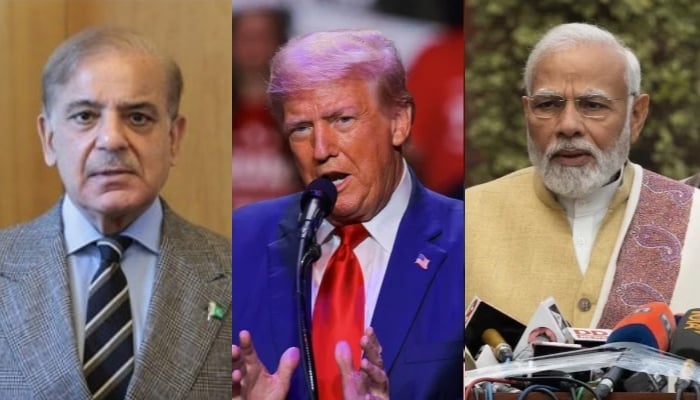Measured steps
Rather than being more entangled in global power games, India is increasingly being sidelined, snubbed and at times even penalised
October 11, 2025

For years, New Delhi has manipulated the label of ‘net security provider’ and ‘democratic counter to China’ to its own benefit under the so-called rhetoric of ‘strategic autonomy’.
Yet, by late 2025, India finds itself caught in an uncomfortable paradox. Rather than being more entangled in global power games, India is increasingly being sidelined, snubbed and at times even penalised. Meanwhile, Pakistan has proven its resilience both militarily and diplomatically, contrary to India’s attempts to isolate Pakistan. This indicates that fault lines in India’s grand strategy are now too glaring to be overlooked.
Globally, the sharpest blow came from Washington. US President Trump, who once considered Indian Prime Minister Modi a personal ally, has now turned India into a political punching bag. Analysts like Raja C Mohan argue that President Trump’s measures are to appease the domestic audience. Regardless of the intent, India is still bearing the brunt of President Trump’s measures, such as tariffs reaching as high as 50 per cent. The ban on outsourcing IT jobs also threatens over three million jobs of Indian workers. This strikes at the very core of India’s $250 billion IT-services trade with the US.
The price hike for H1B visas is also expected to impact Indians, who are estimated to be 70 per cent of the H1B visa holders. Despite the vulnerability this poses to the Indian nationals in America, some have framed this as ‘reverse brain drain’ that could benefit India. But in reality, few high-skilled workers might be eager to abandon their high-paying careers in a developed country for the uncertainty in India. These measures indicate that India’s global economy and its diaspora, which were once a strength, have now suddenly turned into a vulnerability.
However, despite the direct impact on India’s public and economy, PM Modi has guarded himself. He continues to treat personal flattery from Trump’s tweets as political currency, prioritising personal optics over risky dips in India-US. New Delhi has now turned to China to overcome these dips.
Indian experts claim that New Delhi has not ‘chosen China’ but has been ‘pushed’ due to Washington’s policies, making it seem like less of a choice and more of a compulsion for India. However, it appears that either is mostly due to New Delhi’s own miscalculations and egoism. Regardless, despite New Delhi’s outreach to Beijing in times of need, mutual mistrust will continue to hinder truly reliable ties. Due to the China-Pakistan iron brotherhood, New Delhi may be perceived as an outsider and a secondary state.
This was clearly evident from the Shanghai Cooperation Organization (SCO) summit, where Beijing conspicuously avoided naming Modi in its statement. This appears to be a calculated snub that speaks volumes about India’s standing in Beijing. This also suggests that India cannot rely on Beijing when it is sidelined in Washington. True partnerships are a two-way street, and one state cannot unilaterally seek alternative partners, as this requires genuine willingness from the other side too.
India’s outreach to China now clearly reveals India’s cunningness and indicates that it might not have ‘many friends’ after all. This also became starkly evident when Pakistan and Saudi Arabia signed a mutual defence pact. A former Indian diplomat to Saudi Arabia seemed confident in India-KSA ties, but called the signing of the pact as “a disaster for India on [the] diplomatic and defence front”.
What seems personal about this deal is that it was signed on PM Modi’s birthday. Although Saudi Arabia and India have defence ties, this agreement indicates that Saudi Arabia has explicitly decided to deepen its defence alignment with Pakistan, which highlights Riyadh’s concerns that India might not be in a position to extend support in times of need.
Many have expanded the scope of the Pakistan-Saudi defence pact to include nuclear weapons. Some nuclear experts in Islamabad have asked to prepare for such a posture; however, Pakistan’s strategic command has reiterated its defensive and India-centric doctrine on nuclear weapons.
To sum up, Washington’s renewed engagement with Pakistan, Beijing and Islamabad’s enduring strategic partnership, and Riyadh’s growing defence cooperation with Pakistan highlight Islamabad’s strengthening network of historic relations across multiple fronts. Pakistan appears to be capitalising on a broader alignment of interests.
By contrast, India’s positioning as a key US export market, counterweight to China and aspirant partner in the Middle East has encountered limits in a shifting multipolar order. As global dynamics evolve, India’s tactics of diplomatic rigidity and overreliance on strategic optics are exposed. Moving forward, the global environment suggests that states will adopt a cautiously measured approach in their dealings with India.
The writer is a research analyst in emerging technologies and international security. She tweets/posts @MaheenShafeeq
Disclaimer: The viewpoints expressed in this piece are the writer's own and don't necessarily reflect Geo.tv's editorial policy.
Originally published in The News











